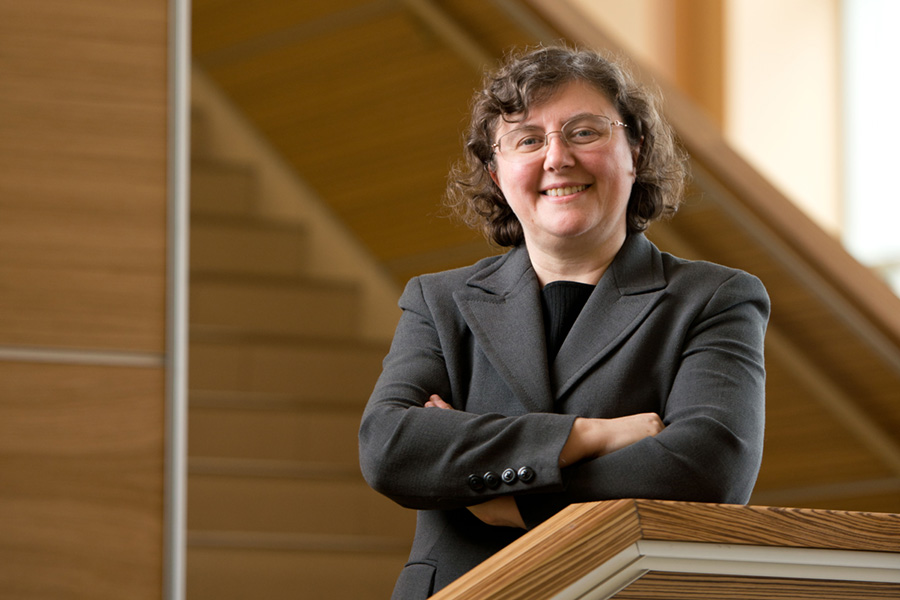Warner School launches Center for Learning in the Digital Age

New center aims to leverage digital technology to enhance learning and development
Digital technology is revolutionizing the face of education. A new center at the University of Rochester’s Warner School of Education aims to provide the resources to help schools and organizations to better capitalize on technology in educational settings.
The Center for Learning in the Digital Age (LiDA), which launched this summer, plans to collaborate with various educational partners to leverage digital resources to improve learning and development in K-12 and higher education settings, as well as across the lifespan in a variety of non-traditional settings. Capitalizing on the Warner School’s expertise in bridging research and practice, the new center will support individual educators and educational institutions to better utilize digital technology to help students succeed.
“The creation of a Center for Learning in the Digital Age enables us to expand on the Warner School’s existing research, resources, programs, and initiatives,” says Warner School Dean Raffaella Borasi, who will serve as director of the new center, “and to lead the way in digital adoption as we aim to provide greater access to digitally-rich learning. The center will provide a go-to location for educators and educational institutions interested in enhancing their teaching practices and effectiveness through the use of digital technologies.”
The need for one centralized place that bridges research and practice on instructional practices of digital resources was the catalyst behind the launch of the new center. The Center for Learning in the Digital Age is uniquely positioned to meet this need because it is founded on years of work around issues related to online and digitally-rich teaching and learning at the Warner School as part of the 2013 strategic plan.
 The center brings together a highly experienced team of researchers, practitioners, and educators to offer a broad array of services and resources that support technology-rich education. Under the direction of Borasi, whose deanship concludes at the end of 2018, the Center for Learning in the Digital Age will build on the momentum generated by the Warner School’s current initiatives and programs and will allow the School and its partners to expand work in this area.
The center brings together a highly experienced team of researchers, practitioners, and educators to offer a broad array of services and resources that support technology-rich education. Under the direction of Borasi, whose deanship concludes at the end of 2018, the Center for Learning in the Digital Age will build on the momentum generated by the Warner School’s current initiatives and programs and will allow the School and its partners to expand work in this area.
The new center will help level the educational playing field by giving educators and educational organizations a new channel for enhancing learning experiences, developing new educational models, and increasing access to research, innovations, instructional programs, and other services that will advance digital technologies in education. Additionally, there will be a focus on doctoral student outreach and participation in research and initiatives related to the digital age.
“Digital technology has created unique opportunities and transformative changes for how we approach accessing information, learn and communicate with one another, and construct and share knowledge,” says Borasi. “As a school of education, we are deeply committed to and invested in the role that digital technology plays in the future of education. It is an area that has tremendous potential.”
The center will build on the Warner School’s graduate programs and courses in online teaching and K-12 Digitally-Rich Teaching, as well as a number of grants recently awarded by the National Science Foundation (NSF) for a total of $7 million. The projects include a $2.8 million NSF-funded grant to provide teachers in rural school districts access to innovative online professional learning experiences in mathematics; a $1.2 million NSF Noyce grant providing a total of 26 full-tuition scholarships over the next five years to prepare future math and science teachers for digitally-rich classrooms, in partnership with the College as well as with East Irondequoit School District and East Upper and Lower Schools; and, most recently, a $3 million NSF grant that will allow the Center for Professional Development and Education Reform, in collaboration with the Center for Learning in the Digital Age, to further its work supporting teachers in leading K-12 school districts through new digital conversion initiatives.
The Center for Learning in the Digital Age will have implications for other initiatives, including a unique five-year partnership with the East Irondequoit Central School District, a leader in digital conversion in schools, that promotes the adoption of a digital conversion model in area K-12 schools. This collaboration led to the creation of a K-12 Digital Conversion Consortium in which nearly two dozen participating districts across the state are collaborating and sharing ideas and resources related to digital conversion efforts. Additionally, the center will complement other current University-wide projects that support ongoing research and online instruction, enhance learning experiences in formal and informal settings, and provide digitally-enhanced support to individuals and families seeking information on disabilities.